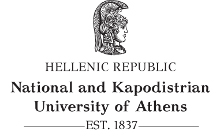The Department of Music Studies is part of the School of Philosophy of the National and Kapodistrian University of Athens. Research and teaching focusses on the study of music as both, academic and artistic, subject. It aims at the cultivation of critical thinking through various dimensions of contemporary musicology (historical and systematic musicology, ethnomusicology and cultural anthropology, sound technology, music education, and byzantine musicology), as well as artistic skills through teaching of musical instruments (of symphony orchestra, traditional Greek music, popular and jazz music, byzantine chant). Many members of the staff, also, have significant artistic activity on the national and international levels.
The coexistence of different academic disciplines and epistemological tendencies within the Department, subscribes to a contemporary international approach to the study of music. The Programme of Study has a wide and interdisciplinary orientation, giving thus students the opportunity to cultivate scientific thought and practice in relation not only to Greek music (ancient, byzantine, traditional, folk and popular), but also to European, electroacoustic music, et.c. The programme, also, emphasizes music pedagogy. Students’ teaching adequacy is certified via relevant courses and practical training. Finally, the Department has a strong record of completed and in progress doctoral theses.
The Department offers a five-year Bachelor’s degree in Music Studies. Upon completion of the undergraduate programme, students are granted an Integrated Master’s Degree on one of the areas of specializations offered (Level 7, National and European Qualification Framework). Graduates can apply to the Department’s postgraduate programmes https://www.music.uoa.gr/metaptychiakes_spoydes/).
Our graduates are employable and active in diverse fields, including:
General education
Special needs music education
Scientific libraries and music archives
Research institutes
Academic and art publications
Cultural institutions
Media
Sound technology and recording
